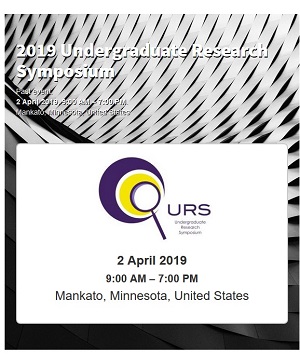Developing Intercultural Competency Among Students in the College of Allied Health and Nursing Students
Location
CSU 201
Start Date
2-4-2019 10:00 AM
End Date
2-4-2019 11:00 AM
Student's Major
Family Consumer Science
Student's College
Allied Health and Nursing
Mentor's Name
Elizabeth Sandell
Mentor's Department
Elementary and Early Childhood Education
Mentor's College
Education
Second Mentor's Name
Lynette Engeswick
Second Mentor's Department
Dental Hygiene
Second Mentor's College
Allied Health and Nursing
Description
The study examined Intercultural Competence (ICC) among a group of university undergraduate students who were early in their studies. Mareno & Hart (2014) noted that demographic patterns have shifted toward becoming more racially and ethnically diverse. Health care providers must be equipped to provide culturally competent care to patients. This study will help universities develop curriculum that fosters student development of their ICC. For this study, ICC was defined as the capability to accurately understand and adapt behavior to cultural difference and commonality (Hammer & Bennett, 2010). The study responded to these research questions: What is the starting level of cultural competence among undergraduate students in the College of Allied Health and Nursing? Data was collected using a computer-based, online inventory. Students enrolled in an introductory course completed the Intercultural Development Inventory (IDI), developed by Hammer and Bennett (1998, 2001). The IDI was based on Bennett's Developmental Model of Intercultural Sensitivity (1986), which identified five orientations toward cultural differences: denial, polarization, minimization, acceptance, and adaptation. Investigators expect that the next step in study may show that students' ICC will grow during a semester long course when it is supplemented with cultural activities. The results of this study will provide institutions with information about the level of ICC of their students and how those levels can be improved so their students are better equipped to help others in the future.
Developing Intercultural Competency Among Students in the College of Allied Health and Nursing Students
CSU 201
The study examined Intercultural Competence (ICC) among a group of university undergraduate students who were early in their studies. Mareno & Hart (2014) noted that demographic patterns have shifted toward becoming more racially and ethnically diverse. Health care providers must be equipped to provide culturally competent care to patients. This study will help universities develop curriculum that fosters student development of their ICC. For this study, ICC was defined as the capability to accurately understand and adapt behavior to cultural difference and commonality (Hammer & Bennett, 2010). The study responded to these research questions: What is the starting level of cultural competence among undergraduate students in the College of Allied Health and Nursing? Data was collected using a computer-based, online inventory. Students enrolled in an introductory course completed the Intercultural Development Inventory (IDI), developed by Hammer and Bennett (1998, 2001). The IDI was based on Bennett's Developmental Model of Intercultural Sensitivity (1986), which identified five orientations toward cultural differences: denial, polarization, minimization, acceptance, and adaptation. Investigators expect that the next step in study may show that students' ICC will grow during a semester long course when it is supplemented with cultural activities. The results of this study will provide institutions with information about the level of ICC of their students and how those levels can be improved so their students are better equipped to help others in the future.
Recommended Citation
Jagodzinkski, Lydia and Rebecca Engeswick. "Developing Intercultural Competency Among Students in the College of Allied Health and Nursing Students." Undergraduate Research Symposium, Mankato, MN, April 2, 2019.
https://cornerstone.lib.mnsu.edu/urs/2019/oral-session-03/4




